Related Research Articles

Sergei Vladimirovich Bodrov is a Russian film director, screenwriter, and producer. In 2003 he was the president of the jury at the 25th Moscow International Film Festival.
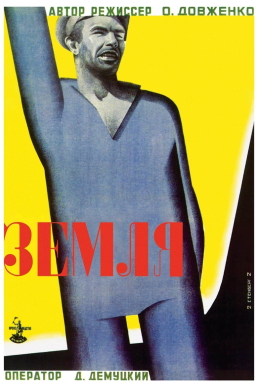
Earth is a 1930 Soviet silent film by Ukrainian director Oleksandr Dovzhenko. The film concerns the process of collectivization and the hostility of kulak landowners under the First Five-Year Plan. It is the third film, with Zvenigora and Arsenal, of Dovzhenko's "Ukraine Trilogy".

Ivan Nikolayevich Perestiani was a Georgian/Soviet film director, screenwriter and actor, and People's Artist of the Georgian SSR (1949). He was of Kefalonian Greek descent.
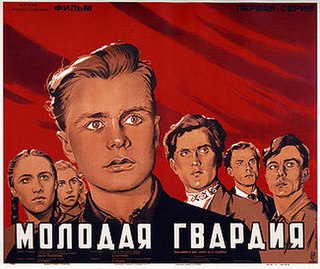
The Young Guard is a two-part 1948 Soviet film directed by Sergei Gerasimov and based on the novel of the same title by Alexander Fadeyev. In 1949 a Stalin Prize for this film was awarded to Gerasimov, cinematographer Vladimir Rapoport, and the group of leading actors.
Georgian Film Studio is one of world's oldest film studios that has produced 800 features, made-for-TV and short films, 600 documentaries, and 300 animation movies. During Soviet times, the studio was one of the most active places for film production. Having grown organically from the merger of several film production companies that operated in the beginning of the twentieth century in Tbilisi, the studio had been renamed several times before becoming Georgian Film in 1953. Sitting on 9.75 hectares of prime land in Tbilisi, Georgian Film Studios offers several sound stages, recording and editing facilities, various production services, modern equipment and professional crews. Georgian Film was founded in 1921.

The Youth of Maxim is a 1935 Soviet historical drama film directed by Grigori Kozintsev and Leonid Trauberg, the first part of trilogy about the life of a young factory worker named Maxim.
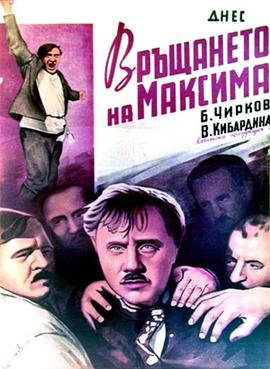
The Return of Maxim is a 1937 Soviet drama film directed by Grigori Kozintsev and Leonid Trauberg, the second part of trilogy about the life of a young factory worker, Maxim.

The Vyborg Side is a 1939 Soviet drama film directed by Grigori Kozintsev and Leonid Trauberg, the final part of trilogy about the life of a young factory worker, Maxim. The film was also released in the United States under the title New Horizons.
Vera Pavlovna Stroyeva was a Soviet film director and screenwriter. Between 1926 and 1983, she directed fifteen films and wrote ten screenplays. Her film adaptation of Modest Mussorgsky's opera Boris Godunov was nominated for a Golden Lion at the 16th Venice International Film Festival and screened out of competition at the 1987 Cannes Film Festival. Many of her films are musicals or adaptations of operas and feature heavy influence from socialist realism.
Giorgi Shengelaia was a Georgian and Soviet film director. He directed 14 films since 1961. His film Pirosmani won the Grand Prize at the Chicago International Film Festival in 1974 and went on to international critical acclaim. His 1985 film The Journey of a Young Composer was entered into the 36th Berlin International Film Festival where he won the Silver Bear for Best Director.
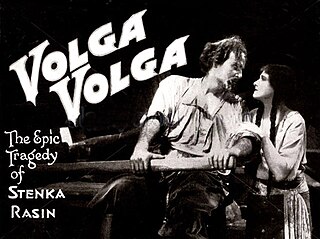
Volga Volga is a 1928 German silent drama film directed by Viktor Tourjansky and starring Hans Adalbert Schlettow, Lillian Hall-Davis, and Boris de Fast. It was one of several Russian-themed films that exiled producer Joseph N. Ermolieff made in Munich during the 1920s. Interiors were shot at the Staaken Studios in Berlin and on location in Wolin. The film's sets were designed by the art directors Andrej Andrejew, Max Heilbronner and Erich Zander. It was distributed in the United States by Kinematrade Inc. in 1933 with dubbed English narration and dialogue, written by Alexander Bakshy, added.

Red Devils is a 1923 Soviet adventure film directed by Ivan Perestiani based on the eponymous story by Pavel Blyakhin. It has become one of the most famous and oft-quoted works of the Soviet adventure film.
The Lights of Baku is a 1950 Soviet drama film directed by Iosif Kheifits, Rza Tahmasib and Aleksandr Zarkhi. The film portrays workers in the oil fields of Azerbaijan during the Second World War, when they were of great strategic importance. Scenes featuring Mikheil Gelovani as Joseph Stalin were later cut after the dictator's death when his cult of personality had come under attack from the new Soviet leadership.
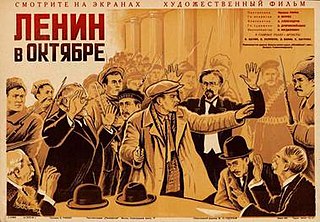
Lenin in October is a 1937 Soviet biographical drama film directed by Mikhail Romm and Dmitri Vasilyev and starring Boris Shchukin, Nikolay Okhlopkov and Vasili Vanin. Made as a Soviet-realist propaganda work by the GOSKINO at the Mosfilm studio, it portrays the activities of Lenin at the time of the October Revolution. All Stalin scenes were expunged from the film for its reissue in 1958.
Man Is Man's Enemy is a 1923 Soviet silent action adventure film directed by Ivane Perestiani.
Nest of Wasps is a 1927 Soviet silent film directed by Ivane Perestiani.
Lyubov Yarovaya is a 1953 Soviet drama film directed by Yan Frid as film adaptation of the original stage production at Leningrad Bolshoi Drama Theater premiered in 1951. Both the stage production and its film adaptation were based on a 1926 play of the same name by Konstantin Trenyov, which was later adapted a second time as a 1970 film made at Lenfilm studios and starring a new generation of actors. The 1953 film was the most popular film released in the Soviet Union that year, with attendance of more than 46 million.
The Miners of Donetsk or Miners of the Don is a 1951 Soviet drama film directed by Leonid Lukov. The film is about the life of miners in Donbas. New technologies are introduced which the miners embrace with enthusiasm.
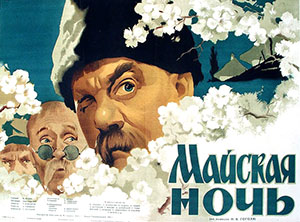
May Nights is a 1952 Soviet 3D fantasy comedy film released by Moscow Gorky Film Studios, directed by Aleksandr Rou and starring Nikolai Dosenko, Tatyana Konyukhova and Aleksandr Khvylya. It is based on Nikolai Gogol's May Night, or the Drowned Maiden and the subsequent opera version by Nikolai Rimsky-Korsakov. It was directed by Alexander Rowe. The film is notable for being the first full-length autostereoscopic film in colour.

Pirosmani is a 1969 Georgian biographical art-drama film directed by Giorgi Shengelaia, about Georgian primitivist painter Niko Pirosmani.
References
- ↑ Rollberg p.526